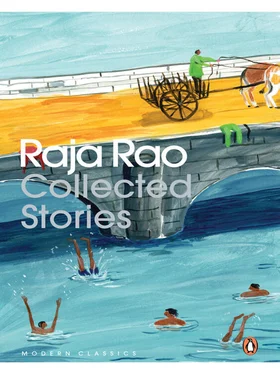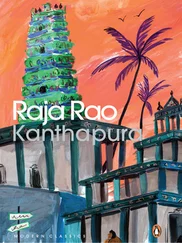Raja Rao - Collected Stories
Здесь есть возможность читать онлайн «Raja Rao - Collected Stories» весь текст электронной книги совершенно бесплатно (целиком полную версию без сокращений). В некоторых случаях можно слушать аудио, скачать через торрент в формате fb2 и присутствует краткое содержание. Год выпуска: 2014, Издательство: Penguin, Жанр: Классическая проза, на английском языке. Описание произведения, (предисловие) а так же отзывы посетителей доступны на портале библиотеки ЛибКат.
- Название:Collected Stories
- Автор:
- Издательство:Penguin
- Жанр:
- Год:2014
- ISBN:нет данных
- Рейтинг книги:5 / 5. Голосов: 1
-
Избранное:Добавить в избранное
- Отзывы:
-
Ваша оценка:
- 100
- 1
- 2
- 3
- 4
- 5
Collected Stories: краткое содержание, описание и аннотация
Предлагаем к чтению аннотацию, описание, краткое содержание или предисловие (зависит от того, что написал сам автор книги «Collected Stories»). Если вы не нашли необходимую информацию о книге — напишите в комментариях, мы постараемся отыскать её.
Collected Stories — читать онлайн бесплатно полную книгу (весь текст) целиком
Ниже представлен текст книги, разбитый по страницам. Система сохранения места последней прочитанной страницы, позволяет с удобством читать онлайн бесплатно книгу «Collected Stories», без необходимости каждый раз заново искать на чём Вы остановились. Поставьте закладку, и сможете в любой момент перейти на страницу, на которой закончили чтение.
Интервал:
Закладка:
‘What do I think of it! I think that you are a wretched imp, and that happily for me one of these days you will be food in the mouth of Death, and I shall drink one full seer of warm milk in satisfaction that I have not to bother myself with such a monkey as you.’ And suddenly rising up, she ran to the kitchen-fuel and, taking a stick, she beat him on the back and on the legs and on the knuckles. Narsa knew quite well, the more he howled and wept the more she would be afraid, for the Master’s brother loved him and disliked people being beaten, so yelling and beating his mouth as at a funeral, Narsa would shriek loud into the night. Far off in the Master’s house, the light was to be seen in the drawing-room — therefore the Master had not yet gone in for dinner. People were sitting round him, and maybe among them would be the Master’s brother.
‘Amma. . Mother. . Amma. .,’ Narsa would gurgle in his throat, as though he was laughing more than weeping. ‘Amma. . ’
‘The Master’s brother has gone to Tippur to buy provisions, you wretch. I’ve seen him on the station road. I’ve seen him with Squint Ramayya, with baskets and sacks. He won’t come to rescue you. And, by the grace of God, for once I’ll give you a good anniversary, a jolly sweet one too.’ And feeling irritated against the constant intrusions of the Master’s brother, auntie beat him all the more. But Narsa really never suffered from it. He knew the Master’s brother would fret and howl at auntie — and then taking Narsa into the big kitchen give him mangoes or city-sweets.
‘You whore of a woman,’ Pariah Lingayya cried out from the cattle-shed where he was chopping hay. ‘Don’t you know this is not the house of the dead, you witch?’
‘It’s not you who bore this child,’ she shouted back, and gave Narsa fresh blows on the back.
Meanwhile the Master’s brother was seen coming through the milky path that winds round the well. He is tall and his cigarette is shining like a firefly. He coughs as he moves along. The spotted calf is prancing behind him, and suddenly running towards him butts him from the back, and leaps across the yard and furrowed field. A pumpkin-moon is just rising over the Rampur temple.
Auntie stops beating, throws her arms akimbo, and feeling very self-righteous, begins the tale before she is questioned.
‘I lick your feet, Master. But this boy is ruinous. He steals everything in the house. He does not even allow a grain of rice to remain in its place. He ate away a quarter of a pau of melted butter yesternight. And just now when I came home. . ’
‘You liar,’ retorts Narsa, sheltering himself behind the back of the Master’s brother. ‘Master, you know I don’t rob, I don’t thieve. I simply eat what I am given. She simply tells lies. Master, she is drunk, that is what it is. . Yesterday night, Master, she and my uncle beat each other. . ’
‘No, Master, no. I lick your feet. No, I’m not drunk.’
‘Give me the accounts. I gave you five annas this afternoon. What did you buy?’
‘Master, I bought. . half a seer of rice, a pau of dal, onions, chillies, salt. .’
‘Where, at the toddy booth, you pariah? Do you think I can’t smell you from here, you wretch, you ruin-of-a-house. You get drunk and beat this orphan till his bones are broken. Unfortunately they’re calling me for dinner. Else it would have been your marriage day. Thank your horoscope it isn’t. Anyway, from today onwards Narsa will sleep in my room. You never can be relied on. Oh, you buffaloes!’
While auntie is falling at the feet of the Master’s brother, Narsa suddenly jumps on her back and cries out ‘hoye-hoye’ as though he were on a sheep. The Master’s brother drags him away with him. In the house they put him by the cradle of the child, and till the dinner is over and people have chewed the betels, Narsa stands recounting story after story to the child. It is hardly ten months old, but whenever it sees a late crow sailing across the sky, it thrusts its little hands towards the porch and cries out, ‘Caw-caw. . Cawww.’
‘Little Master, so the lion said to the tiny mouse,’ continues Narsa, giving the cradle a jerk, ‘I shall be your friend and you shall live with me.’ Across the courtyard, out there in the coppery light, the hut is seen squat as a quern, and at the door two shadows are sitting face to face, lifting their hands to their mouth. Behind is the flat expanse of the shining river, and a quail is heard to splutter through the night. From the palmwoods rise the wails of hungry, clamouring jackals.
After dinner Master came and sat in the courtyard, and the Mistress and others sat round him, listening to him. Master made such funny jokes, and everybody laughed. Sometimes people came from the city to see Master, people with gold rings on every finger of their hands and some that had wives drowned in gold and in nothing but gold. They said Master was a big man and even kings wanted to see him. Auntie said, there was a big, big man called Gandhiji, and the Master knew him, and had talked to him, and the Master worked for him. Who was this Gandhiji, Narsa had asked. ‘An old man — a bewitching man, a saint, you know! He had come from village to village, and I have beheld him too,’ auntie said. ‘He looks beautiful as the morning sun, and he wears only a little loincloth like a pariah. And they say he is for us pariahs, like the Master is for us pariahs. They say he works for the pariahs as the Master works for us. They say he loves the pariahs, as the Master loves us. He is a great man. They say he is an incarnation of God, that is why everybody touches his feet, even Brahmins, my son. You will touch his feet too, some day,’ auntie had assured him. ‘When you touch his feet you feel as though the body has sunk to the earth, and you are nothing but a mere ant before an elephant. But he is so simple! He pats you on the back, and says we must love each other, and spin at home, and when he says don’t pay revenue dues to the Red-man’s Government, we should not pay them. You know those city-boys who come to learn under the Master. They are the Mahatma’s men. And the Master, he is a Mahatma’s relation — one of his chiefs.’
And Narsa was so moved that, that very evening, he slipped beside the chair of the Master, and putting his two little hands on the Master’s legs tried to massage them. The Master patted him on the back and said:
‘Why are you here, Narsiga?’
‘Master, Master,’ he blubbered, ‘I felt like it. You see, Master, I love you. And you love me, Master. And auntie said you are a Mahatma’s man. And I love the Mahatma too. . ’
And when Narsa had said this, everybody around him laughed so much that he felt overcome with shame and wanted to slip out of the place, when the Master’s brother caught him by the hair and thrust him back into his seat. But the Master was so kind that he made Narsa sit on the arm of the chair, and caressed his neck and his back. He is such a good man, the Master! But then all of a sudden the Mistress turns to Narsa and says:
‘Narsiga, what has happened to you, my dear fellow? Why is it I saw you this morning with a huge big shoe, twice as big as your head? What has happened to the ones I gave you?’
‘Mother,’ he lisped, ‘the ones you gave me, Mother. . I lost them by the canal. . the other day.’ Seeing that the Mistress was not angry, he became bolder and continued: ‘You see, Mother, it happened like this. I had let the sheep eat the bael leaves. I had torn them down with my scythe and I had let the poor lambs eat them. They were munching and munching. I saw a big dog coming from the opposite side. Mother, it was on the opposite side of the canal. You know, Mother, the same dog that had eaten away our small deer and had left the bones by Ramayya’s hut. It is big as a wolf, Mother. I threw stones at him.’
Читать дальшеИнтервал:
Закладка:
Похожие книги на «Collected Stories»
Представляем Вашему вниманию похожие книги на «Collected Stories» списком для выбора. Мы отобрали схожую по названию и смыслу литературу в надежде предоставить читателям больше вариантов отыскать новые, интересные, ещё непрочитанные произведения.
Обсуждение, отзывы о книге «Collected Stories» и просто собственные мнения читателей. Оставьте ваши комментарии, напишите, что Вы думаете о произведении, его смысле или главных героях. Укажите что конкретно понравилось, а что нет, и почему Вы так считаете.












